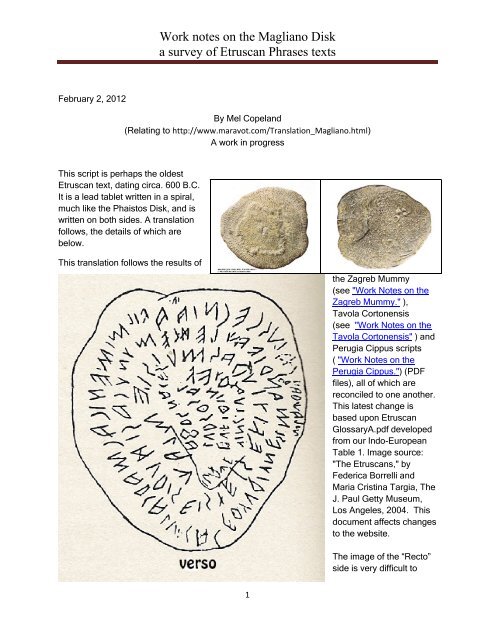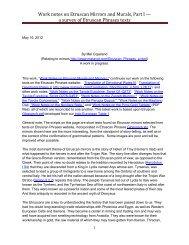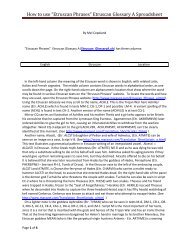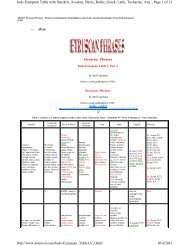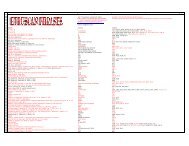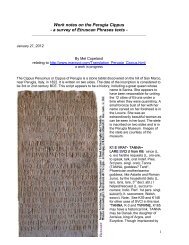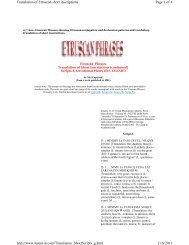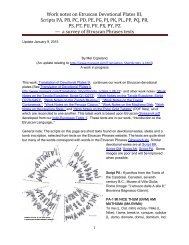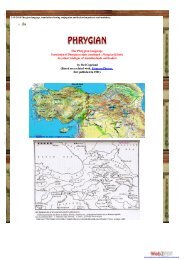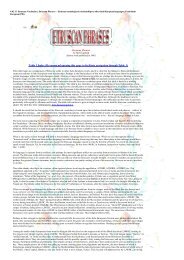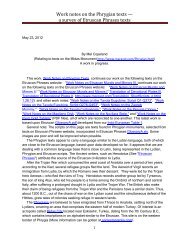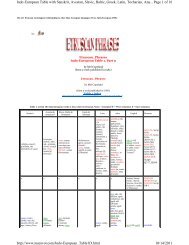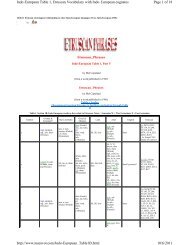Work notes on the Magliano Disk a survey of ... - maravot.com
Work notes on the Magliano Disk a survey of ... - maravot.com
Work notes on the Magliano Disk a survey of ... - maravot.com
Create successful ePaper yourself
Turn your PDF publications into a flip-book with our unique Google optimized e-Paper software.
February 2, 2012<br />
<str<strong>on</strong>g>Work</str<strong>on</strong>g> <str<strong>on</strong>g>notes</str<strong>on</strong>g> <strong>on</strong> <strong>the</strong> <strong>Magliano</strong> <strong>Disk</strong><br />
a <strong>survey</strong> <strong>of</strong> Etruscan Phrases texts<br />
By Mel Copeland<br />
(Relating to http://www.<strong>maravot</strong>.<strong>com</strong>/Translati<strong>on</strong>_<strong>Magliano</strong>.html)<br />
A work in progress<br />
This script is perhaps <strong>the</strong> oldest<br />
Etruscan text, dating circa. 600 B.C.<br />
It is a lead tablet written in a spiral,<br />
much like <strong>the</strong> Phaistos <strong>Disk</strong>, and is<br />
written <strong>on</strong> both sides. A translati<strong>on</strong><br />
follows, <strong>the</strong> details <strong>of</strong> which are<br />
below.<br />
This translati<strong>on</strong> follows <strong>the</strong> results <strong>of</strong><br />
1<br />
<strong>the</strong> Zagreb Mummy<br />
(see "<str<strong>on</strong>g>Work</str<strong>on</strong>g> Notes <strong>on</strong> <strong>the</strong><br />
Zagreb Mummy." ),<br />
Tavola Cort<strong>on</strong>ensis<br />
(see "<str<strong>on</strong>g>Work</str<strong>on</strong>g> Notes <strong>on</strong> <strong>the</strong><br />
Tavola Cort<strong>on</strong>ensis" ) and<br />
Perugia Cippus scripts<br />
( "<str<strong>on</strong>g>Work</str<strong>on</strong>g> Notes <strong>on</strong> <strong>the</strong><br />
Perugia Cippus.") (PDF<br />
files), all <strong>of</strong> which are<br />
rec<strong>on</strong>ciled to <strong>on</strong>e ano<strong>the</strong>r.<br />
This latest change is<br />
based up<strong>on</strong> Etruscan<br />
GlossaryA.pdf developed<br />
from our Indo-European<br />
Table 1. Image source:<br />
"The Etruscans," by<br />
Federica Borrelli and<br />
Maria Cristina Targia, The<br />
J. Paul Getty Museum,<br />
Los Angeles, 2004. This<br />
document affects changes<br />
to <strong>the</strong> website.<br />
The image <strong>of</strong> <strong>the</strong> “Recto”<br />
side is very difficult to
<str<strong>on</strong>g>Work</str<strong>on</strong>g> <str<strong>on</strong>g>notes</str<strong>on</strong>g> <strong>on</strong> <strong>the</strong> <strong>Magliano</strong> <strong>Disk</strong><br />
a <strong>survey</strong> <strong>of</strong> Etruscan Phrases texts<br />
read, and thus, we rely <strong>on</strong> an artist rendering. It is perhaps relevant that <strong>the</strong> form <strong>of</strong> <strong>the</strong> disk<br />
resembles a heart and <strong>the</strong> message <strong>of</strong> <strong>the</strong> disk appears to be an expressi<strong>on</strong> <strong>of</strong> love. Correcti<strong>on</strong>s<br />
will be made when a better image <strong>of</strong> <strong>the</strong> original is obtained.<br />
M-1 NI LACHTHAR CALVS CEC NIA AFIL MI MENICA Ce MARCA nor, not (L. nae, ne; no, not<br />
L. n<strong>on</strong>; It. no; Fr. N<strong>on</strong>; Baltic-Sudovian, ne, ni) a reader (L. lector-oris) <strong>of</strong> toughness, insensibility<br />
(L. callum-i, 2 nd Decl. Gen. singl. us, er, um) Cecnia, place? or alternatively, whatever (L.<br />
quacumque; It. checche; Fr. quelque) indeed, truly (L. nai, ne, nae) suitable, fit (L. habilis-e)<br />
mine, my (L. meus-a-um; mihi, Dat. It. mi, myself) sleeve serving as a glove, handcuffs,<br />
manacles (L. manica-ae) to us (It. ce) he marks (L. marcus-i; It. marcare; Fr. marque, mark)<br />
M-10 LOS (LVS) CALE RYV DIVNE MANRIFA IS? CHLES (KLES) LE MYNVCA or MYNVIA<br />
SIS VRIS <strong>the</strong> light, especially daylight, a day (L. Lux, lucis); you call call, summ<strong>on</strong> (L. calo-are)<br />
<strong>the</strong> river river (L. rivus-i, stream; It. rio; Fr. rivière) Di<strong>on</strong>e, goddess, mo<strong>the</strong>r <strong>of</strong> Aphrodite, goddess<br />
Minerva, goddess <strong>of</strong> war, wisdom, arts & sciences (L. Minerva-ae) he (L. Nom. is) <strong>the</strong> keys key<br />
(L. clavis-is; It. chiave; Fr. clé or clef) <strong>the</strong>m, <strong>the</strong>re, to her? (It. le) <strong>the</strong> smallness (L. minutia-ae)<br />
wish, to be willing (L. sis = si vis; Fr. souhaiter) you speak, talk (L. oro-are; orem, Ind. C<strong>on</strong>j.<br />
Pres. 2 nd pers. singl. ōrēs; Palaic, wer).<br />
Note: Di<strong>on</strong>e is a female Titan, a daughter <strong>of</strong> Oceanus and Tethys (Hesiod. Theog.353), and,<br />
according to o<strong>the</strong>rs, <strong>of</strong> Uranus and Ge, or <strong>of</strong> Ae<strong>the</strong>r and Ge. (Hygin. Fab.Praef.; Apollod. i. 1. §<br />
3.) She was beloved by Zeus, by whom she became <strong>the</strong> mo<strong>the</strong>r <strong>of</strong> Aphrodite. (Apollod. i. 3. sec;<br />
i.; Hom. Il. v. 370, &c.) In some traditi<strong>on</strong>s she is called <strong>the</strong> mo<strong>the</strong>r <strong>of</strong> Di<strong>on</strong>ysus. (Schol. ad Pind.<br />
Pyth. iii. 177; Hesych. s. v. Bakchou Diônês).<br />
Minerva is a Roman goddess regularly identified with A<strong>the</strong>na. Minerva was <strong>the</strong> patr<strong>on</strong>ess <strong>of</strong> <strong>the</strong><br />
arts and crafts and <strong>the</strong>refore <strong>of</strong> <strong>the</strong> intelligence and skill required for <strong>the</strong>ir practice. These<br />
qualities were extended to <strong>the</strong> skills <strong>of</strong> war. Minerva appears in several Etruscan texts and<br />
mirrors: MEFARFA DH-2, DL-4, MH-1; MENRFA, MR-2, MG-3, LM-3, CF-4, CK-1; OB-1;<br />
MANFRA, Mirror #696, British Museum.<br />
M-21 EIS TEIS EFITI VRAS MVLS LEM LACH (LAK) IL ACHEVIN (AKEVIN) Le LVRS RV<br />
EFAL herself (L. eius, sing.; eis, iis pl., himself, herself, itself) <strong>the</strong> goddess (L. deus, divus, di,<br />
divi, dea, diva; It. dio, dia; Fr. dieu, dieux, deese) I avoided, shunned (L. evito-are, Ind. Perf. 1 st<br />
pers. singl. ēvītā́ vī) <strong>the</strong> boundaries (l. ora-ae; It. orio; Fr. orée; Gr. orio) <strong>the</strong> massive c<strong>on</strong>structi<strong>on</strong><br />
(L. moles-is) <strong>the</strong>me (L. lemma-atis) Lachesis-is, f. <strong>on</strong>e <strong>of</strong> <strong>the</strong> three Parcae or Fates, he, his (L.<br />
hic, ille, is; It. egli; Fr. il, ils) <strong>the</strong>y inflamed, encouraged? (L. acuo-uere-ui-utum, Ind. Pres. Imperf.<br />
3 rd pers. pl. acuḗbant) <strong>the</strong>re (le) you loosed, expiated, at<strong>on</strong>ed for (L. luo, luere, lui, luiturus, Ind.<br />
C<strong>on</strong>j. Imperf. 2 nd pers. singl. luerēs) I bedew, moisten (L. roro-are, ros, roris, dew; It. irrorare; Fr.<br />
rosée, dew) Eual, Efal?, name.<br />
M-33 HV FITHI IN AL LVRS THI A8RaS NALES I have, possess (L. habeo-ere, Ind. Pres. 1 st<br />
pers. singl. habeo; It. avere, Fr. avoir) I trusted (fido, fido, fidere, fissus, have trusted, sum, fidā?)<br />
in, into, towards, within (L. in) to him, it (It. al) you loosed, expiated, at<strong>on</strong>ed for (L. luo, luere, lui,<br />
2
<str<strong>on</strong>g>Work</str<strong>on</strong>g> <str<strong>on</strong>g>notes</str<strong>on</strong>g> <strong>on</strong> <strong>the</strong> <strong>Magliano</strong> <strong>Disk</strong><br />
a <strong>survey</strong> <strong>of</strong> Etruscan Phrases texts<br />
3<br />
luiturus, Ind. C<strong>on</strong>j.<br />
Imperf. 2 nd pers.<br />
singl. luerēs) to you<br />
(L. tu; te, accus; vos,<br />
tibi; It. te, ti, to you;<br />
Fr. te, to you) greedy<br />
(L. avaras-a-um)<br />
fare, passage m<strong>on</strong>ey<br />
(L. naulum-I, 2 nd<br />
Decl. Dat -is)<br />
<strong>Magliano</strong> disk, Recto:<br />
M41 CAVTHAS<br />
TVTHIV AFILS<br />
CHXXX ET<br />
CHIMeRuM<br />
CASTHIA LA <strong>the</strong><br />
rock, a rough, sharp<br />
rock (L. cautes-is) so<br />
many times (L. totius)<br />
suitable, fit (L.<br />
habilis-e) that, which<br />
(It. che) thirty or<br />
alternatively 130; and<br />
(L. et; It. e, ed; Fr. et)<br />
chimeras (L. chimaera-ae, Gen. pl -arum; Fr. chimère) pious, religious, holy (L. castus-a-um) or<br />
place, proper name, Castiala <strong>the</strong>re (Fr. la). Note: AFIL(S) appears with Roman numerals in<br />
tomb inscripti<strong>on</strong>s AN, appearing to mean “lived xxx years.”<br />
M-49 LACTH HEFN FE (unrecognizable text, appears rubbed out) I allure (L. lacto-are, Ind.<br />
Pres. 1 st pers. singl. lacto) Euan, name <strong>of</strong> Bacchus (L. Euan)<br />
M-52 MAN MVRIN ASIE 8ALTA THIAS ERAS. IN ECS. I remain, stay (L. maneomanere,<br />
mansi, Ind. Pres. 1 st pers. singl. maneō) Murina (L. Murena-ae, a cognomen in <strong>the</strong> gens<br />
Licinia, 1 st Decl. Acc. pl. –as) <strong>of</strong> Asia (L. Asia (L. Asia-ae) very much so (L. valde) Thia, Titaness,<br />
mo<strong>the</strong>r <strong>of</strong> Eos; possibly Dia, mo<strong>the</strong>r <strong>of</strong> Mercury (L. Dia-ae) you were (L. sum, 2nd Pers. Imperf.<br />
erās) in, into, towards, within (L. in) I leave, to exit (L. exeo-ire, Ind. Pres. 1 st Pers. singl. exeō)<br />
M-60 MENE Me LAR CE MAR NI TVTHI TIVl CHIMaRuM The hand, force, effort, power<br />
(L. manus-us, 4 th Decl. Acc. singl. –um) or alternatively you lead, It. menare, 2nd pers. Ind. Pres.<br />
meni) my (L. mei) god (L. Lar, Laris, Lares) wherewith, wherefrom (L. old ablative <strong>of</strong> qui) <strong>the</strong> sea
<str<strong>on</strong>g>Work</str<strong>on</strong>g> <str<strong>on</strong>g>notes</str<strong>on</strong>g> <strong>on</strong> <strong>the</strong> <strong>Magliano</strong> <strong>Disk</strong><br />
a <strong>survey</strong> <strong>of</strong> Etruscan Phrases texts<br />
(L. mare-is; It. mare; Fr. mar, p<strong>on</strong>d; mer, sea) nor, not (L. nae, ne; no, not L. n<strong>on</strong>; It. no; Fr. N<strong>on</strong>;<br />
Baltic-Sudovian, ne, ni) total, entire (L. tutus-a-um; totius, toti; It. totale, tutto; Fr. tout; Welsh,<br />
tuath) god-like, divine (L. divus-a-um) chimeras (L. chimaera-ae, Gen. pl -arum; Fr. chimère)<br />
M-67 CA THIA Le THI ACR MARIS Le ME NI TIA A8aRAS CIA LATH by which way,<br />
where, whereby, as far as (L. qua) Thia, Titaness, mo<strong>the</strong>r <strong>of</strong> Eos; possibly Dia, mo<strong>the</strong>r <strong>of</strong><br />
Mercury (L. Dia-ae) <strong>the</strong>re (le) you, your (L. tu; te, accus; vos, tibi; It. te, ti, to you; Fr. te, to you)<br />
call, to (L. accio-aire) Mars? (L. Mars, Martis, [old form Mavors]) <strong>the</strong>re (le) me (L. Acc. me) nor,<br />
not (L. nae, ne; no, not L. n<strong>on</strong>; It. no; Fr. N<strong>on</strong>; Baltic-Sudovian, ne, ni) Thia, Titaness, mo<strong>the</strong>r <strong>of</strong><br />
Eos; possibly Dia, mo<strong>the</strong>r <strong>of</strong> Mercury (L. Dia-ae) or alternatively <strong>the</strong> day (L. dies-ei, day; diu, by<br />
day; diutiuus, l<strong>on</strong>ger; Welsh, dydd; Scot, di) greedy (L. avaras-a-um) because (L. quia) I praise<br />
laud (L. laudo-are, Ind. Pres. 1 st pers. laudō)<br />
M-80 CHIMaRuM AFILS CHe ECA CEPEN TVTHIV THVCHI CHVTE FER chimeras<br />
(L. chimaera-ae, Gen. pl -arum; Fr. chimère) suitable, fit (L. habilis-e) that, which (It. che) <strong>the</strong>y<br />
separate, part (L. separo-are, Ind. Pres. 3rd pers. pl. sēparant) so many times (L. totius) togas,<br />
<strong>the</strong> white woolen upper garment worn by Roman citizens (L. toga-ae, 1 st Decl. pl. -ae) a surplice<br />
(It. cotta, f. - a loose white outer ecclesiastical vestment usually <strong>of</strong> kneelength with large open<br />
sleeves) I bear, carry, display (L. fero, ferre, Ind. Pres. 1 st Pers. singl. fero)<br />
M-89 HESNI or 8ES NI NIVL FENI ETH or ER TVCI or YVCI AMAR I eat (L. vescor-i,<br />
Indic. Pres. 1 st pers. singl. vēscō; ingere-gerere-gessi-gestum; Sanskrit, ghas, ghasti, to devour)<br />
nor, not (L. nae, ne; no, not L. n<strong>on</strong>; It. no; Fr. n<strong>on</strong>; Baltic-Sudovian, ne, ni); nothing (L. nihil, nil)<br />
came, arrived (L. venio, venita, veni, ventum, Ind. Perf. 1 st pers. singl. venī, 3 rd pers. singl. venit;<br />
It. venire) or alternatively, finished (L. finio-ire, Ind. Perf. 1 st pers. singl. fīnī ́vī, Ind. Pres. 3 rd pers.<br />
singl. fīnit); I err, wander (L. erro-are, Ind. Pres. 1 st pers. singl. errō) I was yoked (L. to bind, iugoare,<br />
Ind. Perf. Iugā́ vī); Welsh, ieuo) to love (L. amo-are, Act. C<strong>on</strong>j. Imperf. 1 st Pers. singl.<br />
amā́ rem, I loved)<br />
Launched: 02.02.12<br />
Copyright © 1981-2012 Mel Copeland. All rights reserved.<br />
4


